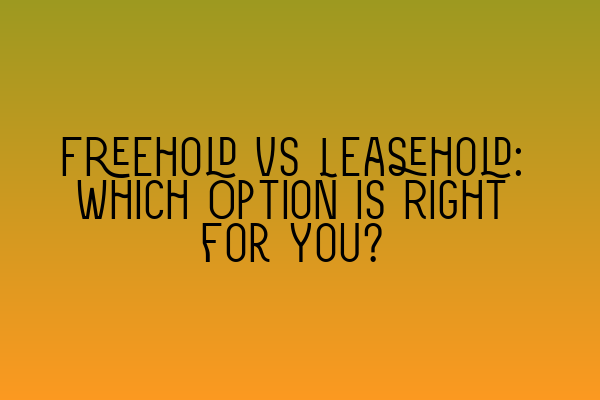This blog post is brought to you by SQE Property Law & Land Law, a leading solicitor firm specializing in property law matters. Today, we will be exploring a crucial decision that many property buyers face: whether to opt for a freehold or a leasehold property. We understand that this decision can be complex and overwhelming, so we have compiled this comprehensive guide to help you make an informed choice.
The Basics: Freehold vs Leasehold
When it comes to property ownership, there are two primary options: freehold and leasehold. Let’s delve deeper into each option and highlight their key characteristics:
Freehold: Absolute Ownership
A freehold property grants you absolute ownership of both the property and the land it stands on. In other words, you have full control and can make all decisions regarding your property, subject to planning and legal regulations. Freehold properties are typically houses or bungalows rather than apartments or flats.
One of the primary benefits of owning a freehold property is the absence of ground rent or service charges, providing financial freedom in the long run. Additionally, as the sole owner, you have greater freedom to alter or expand your property as you see fit.
Leasehold: Ownership with Conditions
On the other hand, when you purchase a leasehold property, you acquire the right to occupy the property for a specified period of time through a lease agreement with the freeholder. Generally, lease lengths can vary from a few decades to several hundred years.
Leasehold properties are commonly found in apartment blocks, townhouses, and some older houses. While you enjoy occupation and use of the property during the lease term, ultimate ownership still rests with the freeholder.
It’s important to note that leasehold properties often come with additional financial responsibilities, such as ground rent and service charges. The freeholder is responsible for maintaining the building, common areas, and any shared services, and these costs are typically shared among the leaseholders.
Factors to Consider
Now that we have a better understanding of the basic differences between freehold and leasehold properties, let’s explore some key factors to consider when making your decision:
1. Long-term Perspective
If you’re planning to put down roots and stay in your property for an extended period, a freehold property may be the best option. Freehold properties generally provide more security and autonomy, allowing you to make changes to your property without seeking permission from the freeholder.
2. Affordability
Leasehold properties are often priced lower than freehold properties due to the leasehold tenure and associated responsibilities. However, it’s crucial to factor in additional costs such as ground rent, service charges, and potential lease extension fees when assessing the overall affordability.
3. Maintenance and Responsibilities
In a leasehold property, the freeholder is responsible for specific maintenance tasks and repairs, but the costs are shared among the leaseholders. This can be advantageous if you prefer not to worry about building maintenance and enjoy the convenience of outsourced responsibilities.
On the other hand, freehold properties grant you complete control and responsibility over all maintenance and repairs. While this may require greater financial investment, it also allows you to customize and manage these aspects according to your preferences.
4. Investment Potential
Investors often consider the potential return on investment when choosing between freehold and leasehold properties. While both options can offer excellent investment opportunities, factors such as location, market demand, and lease length need to be carefully evaluated.
Misrepresentation in Contracts: Unveiling Deceptive Practices
When purchasing a property, it’s imperative to understand the legal implications and contractual terms involved. Misrepresentation in contracts can have serious consequences, so it’s essential to be aware of deceptive practices and safeguard your rights. To dive deeper into this topic, check out our insightful article on Misrepresentation in Contracts: Unveiling Deceptive Practices.
SQE Contract Law: Analyzing Landmark Cases and Influential Judicial Decisions
Understanding the legal framework surrounding property ownership can be daunting. That’s why our team at SQE Property Law & Land Law has compiled a collection of landmark cases and influential judicial decisions that have shaped contract law. Enhance your knowledge by exploring our article on SQE Contract Law: Analyzing Landmark Cases and Influential Judicial Decisions.
Understanding Contractual Capacity: Rights and Limitations
Contractual capacity plays a vital role when entering into property agreements. It determines an individual’s legal ability to understand, agree to, and fulfill contractual obligations. To gain a comprehensive understanding of this crucial aspect, read our article on Understanding Contractual Capacity: Rights and Limitations.
Interactive SQE Mock Tests for Contract Law: Test Your Knowledge
Take your contract law knowledge to the next level with our interactive SQE mock tests. Designed to assess your understanding and expertise, these tests provide valuable insights into the application of contract law principles to property matters. Evaluate your knowledge today by accessing our Interactive SQE Mock Tests for Contract Law: Test Your Knowledge.
Join Our SQE Contract Law Webinars: Expert Insights and Guidance
We invite you to join our SQE Contract Law webinars, where our expert solicitors share valuable insights and guidance on various legal topics, including property law. Stay up to date with the latest industry developments and gain a deeper understanding of contract law principles by participating in our webinars. Learn more about our webinars and upcoming sessions here.
Conclusion
Choosing between a freehold and a leasehold property is a significant decision that depends on various factors, including your long-term plans, affordability, maintenance preferences, and investment objectives. By considering these factors and thoroughly researching your options, you can make a well-informed choice that suits your needs and preferences.
For professional guidance and assistance with property law matters, including freehold and leasehold transactions, contact SQE Property Law & Land Law today. Our experienced solicitors will provide personalized advice and support throughout the process, ensuring a smooth and successful property transaction.
